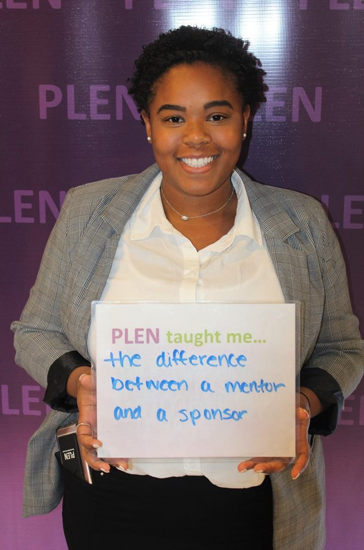
Meet LaKia Williams! LaKia is a neuroscience major who recently attended Public Leadership Education Network (PLEN)’s Women in Health Policy seminar thanks to funding from Newcomb College Institute. Read about her experience below:
Describe yourself and why you wanted to attend the PLEN conference:
While I care about medicine and how that relates to women’s health I also care about the social determinants of women’s health, particularly reproductive health, and the ways in which laws and institutions perpetuate a lack of Reproductive Justice. I have been trying to decide if I want to pursue an MD or MD/MPP (Master’s of Public Policy) and so I was excited to attend this conference and learn about women who were possibly practicing medicine and working on legislation or advocating for legislation.
What were your favorite parts of the conference?
My favorite part of the conference was listening to the panelists and being able to ask them questions and have a dialogue about varying topics, from how they secured jobs on Capitol Hill to their personal life.
I also enjoyed getting to meet the other students and learn about the impressive things they are involved in. I met a Rutgers student named Mariam who has an impressive internship history, and after I mentioned my interest in one of her internships she showed me the application process, and different ways to increase my possibility of getting accepted. Being able to connect with Mariam, and other girls like Kyra, Sarah, Layla, Angel, and Tiwonge, opened my eyes to different cultures and different career paths, and honestly made my conference experience that much more enjoyable.
Highlight a speaker or a job site you visited:
One of the panelists that I thoroughly enjoyed was Faisa Ali from the Maternal and Child Health Session. I felt like I really connected with her because she worked at the Edna Aba Maternity Hospital in Somaliland. Edna and her hospital were both featured in the book I read two years ago that made me want to be an Ob/Gyn and that opened my eyes to the injustice women face in regards to the reproductive rights and health. Ali spoke about how important it is that we know the issues such as fistulas and female genital mutilation (FGM) because many people already doing the work don’t know these terms. I also intensely appreciated the opportunity to listen to Ms. Faisa speak because, as someone who works for the American College of Obstetricians and Gynecologist, she knows a lot about the medical side of Reproductive Justice, Rights, and Health. And one of the things that she taught me was the importance of training our doctors to understand the social determinants of health and to be aware of some of the social practices that while they aren’t common to us in America, or widely lived in other countries. For example, she talked about the refugee and immigrant communities and how many women need surgery to reverse the genital mutilation they receive, specifically when their labias are sewn together to inhibit sexual intercourse. Ali spoke about how few doctors in America know how to reverse this surgery and that fact coupled with the stigma that the women fear of receiving forces them to pursue illegal, unsafe options to get the medical care they need. And this sounds all too familiar of an issue. From Ms. Faisa Ali I didn’t only learn about the need for FGM reversing surgeries but the overall importance of listening to patients and understanding what they need because as providers we can’t always anticipate what they need but we can always listen and learn.
Tell us one thing you learned that you hope to never forget:
On the first day we told about informational interviews and how important they are and how to go about conducting them. The speaker told us that we should always bring our resumes to these interviews and try to have as many people see our resumes as possible. I will also never forget how important it is to network with your equals or peers; I feel that for many people my age we often think of networking as something we have to do with professionals who are well established in their careers but through this conference I was able to meet and connect with so many other undergraduate women across the nation. They taught me things I didn’t know about.
Why should other students attend a PLEN conference?
Other students should attend PLEN because it will help you grow in a professional sense and also open your mind. The panels are filled with people of different views that will allow you to listen to people you disagree with and to learn from. PLEN is also an opportunity for you to stand out and make connections that can become helpful in the future or in the present. At one of the panels I asked a question and mentioned that I work in New Orleans, and afterward a woman approached me and asked me about my work. I told her I am an intern for the Institute of Women and Ethnic Studies and since she was formerly based in New Orleans she knew of IWES. From there we connected and she offered to go out for coffee and learn more about each other. Opportunities like this are what make PLEN so impactful.
Does this sound like something you might be interested in? Tulane undergraduate students can apply to NCI for funding to attend PLEN conferences. Email Anna Mahoney at amhone4@tulane.edu for more information.
Responses have been lightly edited for length and clarity.
